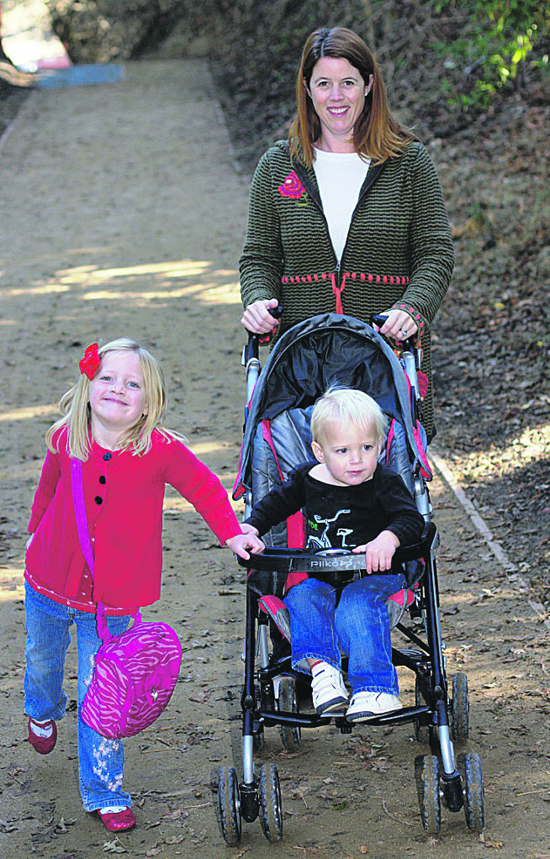 | | | Christy, Georgia and Tyler Winkle on the Burton
Ridge Trail Connector. Photo provided
| | | | | | Christy, Georgia and Tyler Winkle enjoy the recently completed all-weather trail that meanders through the north-end of the Lafayette Community Park and connects to the Community Center. Although the Winkle family clearly likes the walkway, there were a few heated public hearings that precluded the completion of the two-part Burton Ridge Trail Connector.
 Many nearby homeowners were not thrilled with the path, calling it a "trail to nowhere" and "unnecessary and wasteful" along the already quiet residential street. One fellow who testified about the trail in the summer noted that now that it's complete some of the neighbors are coming around.
Many nearby homeowners were not thrilled with the path, calling it a "trail to nowhere" and "unnecessary and wasteful" along the already quiet residential street. One fellow who testified about the trail in the summer noted that now that it's complete some of the neighbors are coming around.
 On a recent sunny day, Christy Winkle and her kids were using the path, "I will always treasure the memories of taking the trail from our house to the Community Center starting with the baby bjorn and then strollers and then push bikes and then bikes with training wheels and then off they go in the distance on their own bikes...We are so thankful for all the good times our family has had at the Community Center over the years."
On a recent sunny day, Christy Winkle and her kids were using the path, "I will always treasure the memories of taking the trail from our house to the Community Center starting with the baby bjorn and then strollers and then push bikes and then bikes with training wheels and then off they go in the distance on their own bikes...We are so thankful for all the good times our family has had at the Community Center over the years."
 The project connects the neighborhood to the Lafayette Community Center and Community Park along with the Lafayette-Moraga Regional Trail and provides safe, designated, less muddy routes for walkers and cyclists.
The project connects the neighborhood to the Lafayette Community Center and Community Park along with the Lafayette-Moraga Regional Trail and provides safe, designated, less muddy routes for walkers and cyclists.
 The Burton Ridge Trail Connector project has two parts - first the Murray Lane Trail component along an undeveloped city-owned parcel on the south side of Murray Lane between Michael Lane and Burton Drive. The skinny strip of land a quarter of a mile long has been dedicated for park and trail use since 1987, when the Murray Lane subdivision was built.
The Burton Ridge Trail Connector project has two parts - first the Murray Lane Trail component along an undeveloped city-owned parcel on the south side of Murray Lane between Michael Lane and Burton Drive. The skinny strip of land a quarter of a mile long has been dedicated for park and trail use since 1987, when the Murray Lane subdivision was built.
 The second portion is the Community Park North End Weatherization project - a formerly muddy in the rainy season trail in the north end of the Community Park serves as a maintenance and emergency access road. Originally composed of dirt and wood chips it becomes understandably challenging to traverse when wet. Funds were used to weatherize the trail adding edging, a rock sub-base and decomposed granite surface.
The second portion is the Community Park North End Weatherization project - a formerly muddy in the rainy season trail in the north end of the Community Park serves as a maintenance and emergency access road. Originally composed of dirt and wood chips it becomes understandably challenging to traverse when wet. Funds were used to weatherize the trail adding edging, a rock sub-base and decomposed granite surface.
 City engineers estimated the total cost of the projects to be $502,000 for both components, but the actual cost came in at $418,377. Construction costs at $307,777 made up the lion's share, but the project also required design and survey work, reports by an arborist and landscape architect and other services. These projects were funded entirely with voter-approved East Bay Regional Park District Measure WW monies that can only be used for acquisition of and improvements to parks and trails.
City engineers estimated the total cost of the projects to be $502,000 for both components, but the actual cost came in at $418,377. Construction costs at $307,777 made up the lion's share, but the project also required design and survey work, reports by an arborist and landscape architect and other services. These projects were funded entirely with voter-approved East Bay Regional Park District Measure WW monies that can only be used for acquisition of and improvements to parks and trails.

|
